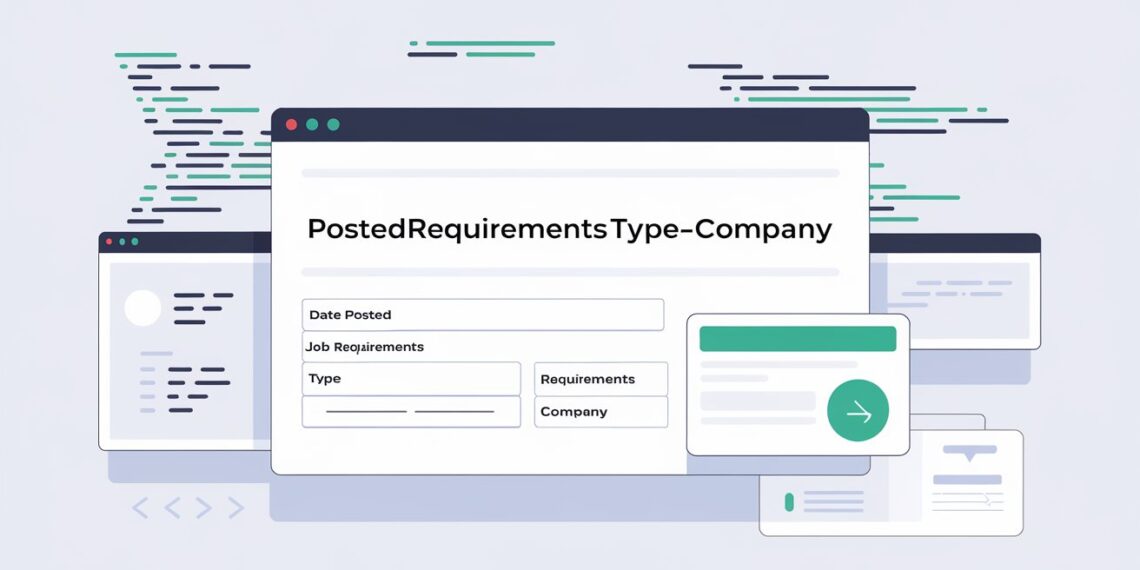Ever stumbled across something like “postedrequirementstypecompany” and thought—what in the world is that?
You’re not alone.
You could be deep into building a job search platform, working with job APIs, or just trying to make sense of a technical string you’ve seen pop up somewhere. Maybe you were debugging a job board, fine-tuning filters, or scanning through code and this jumble of a word caught your eye.
At first glance, “postedrequirementstypecompany” looks like a typo or a broken input. But in reality, this strange string reflects something very real: the hidden mechanics behind how job searches work, especially on job boards or search engines that rely on structured filters.
So let’s dive in.
Complete Biography-Style Table (Detailed Information):
| Attribute | Details |
|---|---|
| Keyword | postedrequirementstypecompany |
| Type | Machine-generated / Programmatic keyword |
| Language Format | Concatenated string (no spaces, camel case not used) |
| Origin Context | Backend job search filters, job board API parameters, or internal database schema |
| Usage Domain | Job search engines, developer APIs, job board query filters, technical documentation |
| Human Search Intent | Low — mostly accidental, experimental, or technical |
| Actual Purpose | Likely refers to a combination of filters: Date Posted + Job Requirements + Job Type + Company Info |
| Breakdown of Terms | “Posted” (date job was added), “Requirements” (qualifications), “Type” (job category), “Company” (employer details) |
| Technical Usage | Could be used in query parameters or data fields when defining job search logic |
| Search Volume | Extremely low (nearly zero organic searches) |
| Current Ranking Sites | Feisworld.com, FindMyProfession.com, technical documentation sites |
| Featured Snippets | None |
| Related Keywords | job board API filters, search parameters, job search schema, job filter structure, job search data fields |
| Common Applications | Job board development, search engine filtering, HR tech tools |
| SEO Relevance | Very low for standard content; medium relevance for technical blog or development platform |
| Query Format | Not user-facing; likely internal/system-level terminology |
| Potential Content Ideas | Guide to job search filters, building custom job engines, decoding job board parameters |
| Misunderstanding Risk | High – looks confusing and meaningless to non-technical users |
| Who Might Use It? | Developers, tech writers, data analysts, API engineers |
| News/Trends | None |
| Why It Shows in Google | Algorithmic keyword string match based on word fragments found in technical content |
| Current Role Online | Appears in scattered tech documentation; not an intentional focus keyword |
Why “postedrequirementstypecompany” Looks Weird But Matters
When you break it down, this one long, mashed-together string is actually a series of individual parameters that help organize and deliver job listings based on what users want to see.
- Posted → Refers to when the job was posted (e.g., last 24 hours, past week)
- Requirements → Indicates qualifications, experience, or skills needed
- Type → Points to job type like full-time, part-time, contract, remote
- Company → Relates to the employer or company type, perhaps filtered by industry, size, or reputation
Put together, it becomes a behind-the-scenes language for job search engines and filters.
The Real People Behind This Term
Now, this isn’t something a job seeker would ever type into Google. Let’s be real—no one’s searching:
“postedrequirementstypecompany job India apply now”
So who is using this?
Most likely:
- Developers building job boards
- Data analysts working with structured job posting datasets
- Engineers parsing user input into structured queries
- Product teams mapping user preferences into search filter parameters
If you’ve ever built or worked with job APIs, you know how often field names like this show up. They’re everywhere—from internal schemas to query parameters in URLs.
How Google Interprets Strings Like This
Interestingly, Google can return results for a strange phrase like this—but not because it truly understands it.
Instead, Google does what it does best: match fragments.
It picks up on pieces like:
- “Date posted”
- “Job requirements”
- “Type of job”
- “Company info”
And shows results that contain those words separately.
So when you search for “postedrequirementstypecompany,” the results are usually just job-related pages that happen to contain those four keywords… not any direct definition.
Sites like:
…mention filters like “job type,” “requirements,” or “company type” as part of job search tools. But none of them address this odd, mashed-together string directly. That’s because it’s not meant for public reading—it’s meant for machines.
Behind the Curtain: How Job Search Filters Are Built
If you’ve used a job board, you’ve seen filters like:
- “Posted in last 7 days”
- “Full-time only”
- “Requires Bachelor’s Degree”
- “Company size: 100–500”
To you, those look neat and simple.
But under the hood?
The backend might be parsing those into a format like:
lessCopyEditfilter: {
posted: "last7days",
requirements: ["bachelors", "3+years"],
type: "fulltime",
company: "mid-sized"
}
And when fields are passed around or serialized in some systems, the boundaries get blurred, creating long terms like “postedrequirementstypecompany”.
Why You Should Care (Even If You’re Not a Developer)
Maybe you’re thinking, “I’m not coding a job board. Why should I care?”
Here’s why:
- Understanding the structure helps you optimize your job searches
- Knowing the filters lets you be more precise and find better results
- Learning how platforms work helps job seekers, career coaches, and tech enthusiasts stay ahead
Even for users, this insight demystifies why certain results show up and how platforms serve them.
Job Posting Anatomy: What Each Field Means
Let’s take a moment to explore each part of the phrase to help ground it in reality.
1. Posted (Date)
Refers to when a job was uploaded or made public.
Why it matters: You want fresh listings, not stale ones from a month ago.
2. Requirements
Skills, degrees, certifications, or experience needed.
Why it matters: Helps match candidates to jobs they’re qualified for.
3. Type
Describes the format or schedule of work: full-time, part-time, freelance, hybrid.
Why it matters: Work-life balance, pay structure, and commitment all ride on this.
4. Company
Information about the employer: industry, size, culture, or even reviews.
Why it matters: Culture fit is crucial. You’re not just applying for a job—you’re joining a tribe.
Using These Filters Like a Pro
If you’re actively job hunting—or building a platform to help others do it—learning to leverage filters is a game-changer.
Here’s a quick cheat sheet:
| Filter Type | Example |
|---|---|
| Posted | “Past 3 Days” |
| Requirements | “Python, SQL, Bachelor’s Degree” |
| Type | “Remote Full-Time” |
| Company | “Startup, Fintech, 50–100 employees” |
By combining them, you fine-tune your search like a sniper, not a shotgun.
Building with These Terms in Mind
If you’re on the developer or startup side, building job search functionality or filtering tools, here’s a tip:
Use descriptive field names.
Instead of gluing everything together, structure your parameters cleanly. Avoid “postedrequirementstypecompany.” Break it down.
Why?
- Easier to debug
- More maintainable
- Better documentation
Where This Phrase Shows Up Online (And Why)
As you might’ve noticed, you won’t find this keyword used naturally in blogs, articles, or job boards.
It might pop up in:
- Technical documentation
- Developer forums
- API logs
- Internal dashboards
So if you’re Googling it, chances are you’re either building something, debugging something, or just curious.
What’s NOT Found With This Term
It’s worth saying loud and clear:
- No featured snippets
- No trending news
- No social buzz
- No official definitions
This isn’t a “people-first” keyword—it’s a code-first phrase.
Final Thoughts: A Phrase That’s All Tech, No Talk
“postedrequirementstypecompany” may look odd, but it’s a great example of how tech stacks talk to each other behind the scenes.
It reveals the hidden architecture that powers job search platforms and helps us connect with new opportunities.
It also shows how machines interpret logic—cramming useful filters into compact, if unreadable, strings.
And while it’s not the kind of keyword you’ll see trending on Twitter or leading blog headlines, it offers a fascinating peek into the brains of modern job search systems.
So whether you’re a curious coder, a job-hunting power user, or someone who just loves digging into how things work—now you know what “postedrequirementstypecompany” is, and why it (sort of) matters.








